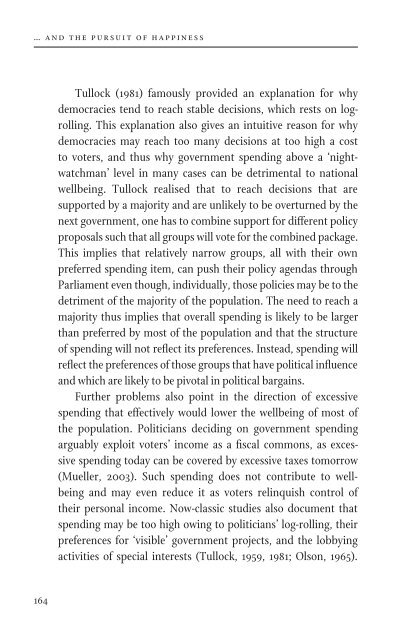… and the Pursuit of Happiness - Institute of Economic Affairs
… and the Pursuit of Happiness - Institute of Economic Affairs
… and the Pursuit of Happiness - Institute of Economic Affairs
You also want an ePaper? Increase the reach of your titles
YUMPU automatically turns print PDFs into web optimized ePapers that Google loves.
<strong>…</strong> <strong>and</strong> <strong>the</strong> pursuit <strong>of</strong> happiness<br />
wellbeing <strong>and</strong> <strong>the</strong> size <strong>of</strong> government<br />
Tullock (1981) famously provided an explanation for why<br />
democracies tend to reach stable decisions, which rests on logrolling.<br />
This explanation also gives an intuitive reason for why<br />
democracies may reach too many decisions at too high a cost<br />
to voters, <strong>and</strong> thus why government spending above a ‘nightwatchman’<br />
level in many cases can be detrimental to national<br />
wellbeing. Tullock realised that to reach decisions that are<br />
supported by a majority <strong>and</strong> are unlikely to be overturned by <strong>the</strong><br />
next government, one has to combine support for different policy<br />
proposals such that all groups will vote for <strong>the</strong> combined package.<br />
This implies that relatively narrow groups, all with <strong>the</strong>ir own<br />
preferred spending item, can push <strong>the</strong>ir policy agendas through<br />
Parliament even though, individually, those policies may be to <strong>the</strong><br />
detriment <strong>of</strong> <strong>the</strong> majority <strong>of</strong> <strong>the</strong> population. The need to reach a<br />
majority thus implies that overall spending is likely to be larger<br />
than preferred by most <strong>of</strong> <strong>the</strong> population <strong>and</strong> that <strong>the</strong> structure<br />
<strong>of</strong> spending will not reflect its preferences. Instead, spending will<br />
reflect <strong>the</strong> preferences <strong>of</strong> those groups that have political influence<br />
<strong>and</strong> which are likely to be pivotal in political bargains.<br />
Fur<strong>the</strong>r problems also point in <strong>the</strong> direction <strong>of</strong> excessive<br />
spending that effectively would lower <strong>the</strong> wellbeing <strong>of</strong> most <strong>of</strong><br />
<strong>the</strong> population. Politicians deciding on government spending<br />
arguably exploit voters’ income as a fiscal commons, as excessive<br />
spending today can be covered by excessive taxes tomorrow<br />
(Mueller, 2003). Such spending does not contribute to wellbeing<br />
<strong>and</strong> may even reduce it as voters relinquish control <strong>of</strong><br />
<strong>the</strong>ir personal income. Now-classic studies also document that<br />
spending may be too high owing to politicians’ log-rolling, <strong>the</strong>ir<br />
preferences for ‘visible’ government projects, <strong>and</strong> <strong>the</strong> lobbying<br />
activities <strong>of</strong> special interests (Tullock, 1959, 1981; Olson, 1965).<br />
Likewise, as government grows, so does <strong>the</strong> power <strong>of</strong> a bureaucratic<br />
elite with incentives to maximise budgets, personal staff or<br />
both (Niskanen, 1971). As bureaucracies grow, controlling <strong>the</strong>m<br />
consumes more resources, such that a growing government automatically<br />
triggers disproportionally higher expenses (Mueller,<br />
2003).<br />
One could argue that democracy allows voters to control politicians<br />
better, which would counteract <strong>the</strong> tendencies towards<br />
excessive government. The public choice literature also documents,<br />
however, that <strong>the</strong> behaviour <strong>of</strong> politicians aiming to be<br />
re-elected contributes to excessive spending <strong>and</strong> resource misallocation,<br />
which is facilitated by a large share <strong>of</strong> voters that are<br />
‘rationally ignorant’ (Downs, 1957). Politicians trying to win elections<br />
have strong incentives to be seen to be ‘doing something’ for<br />
specific groups in society. As such, subsidising important groups<br />
<strong>of</strong> voters or special interests causes excessive spending as well<br />
as additional spending that is allocated to purposes o<strong>the</strong>r than<br />
providing beneficial public goods. In total, much public choice<br />
<strong>the</strong>ory <strong>and</strong> Austrian information economics implicitly predict<br />
that government spending <strong>and</strong> o<strong>the</strong>r activities will ei<strong>the</strong>r be<br />
ir relevant or directly detrimental to wellbeing, when above some<br />
absolutely necessary level.<br />
Main determinants <strong>of</strong> national happiness<br />
When confronting <strong>the</strong>ory with <strong>the</strong> real world, <strong>the</strong> first question to<br />
ask concerns <strong>the</strong> factors that determine <strong>the</strong> differences in levels <strong>of</strong><br />
wellbeing across nations. A growing literature has explored a large<br />
number <strong>of</strong> different factors but found relatively few to be robustly<br />
associated with wellbeing; Bjørnskov et al. (2008a), Frey (2008)<br />
164 165












